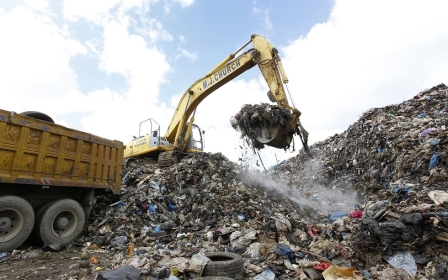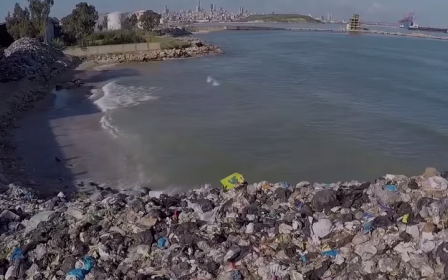Lebanese government stung by mosquito protests amid Zika fears

A plague of mosquitoes has sparked controversy in Lebanon with protesters blaming the government for failing to address the country's months-long rubbish crisis, but authorities insisting the spike in mosquitoes is due to warmer weather.
The spat comes amid growing concerns that the Zika virus and other dangerous mosquito-borne diseases could spread in the country.
Lebanese Environment Minister Mohamed Machnouk took to Twitter on Sunday to warn citizens about the mosquitoes in coastal areas such as Beirut, Tripoli and Sidon which he said were a consequence of the warmer weather.
“Mosquitoes are swarming coastal areas due to rising temperatures. We advise people not to swallow or inhale them,” he said.
But Machnouk later removed the message after social media users hit back, blaming the government's failure to address the rubbish crisis for the situation. Users who responded were immediately blocked by the minister, according to activists.
Translation: I congratulate his excellency the minister of the environment Mohamed Machnouk for his exceptional speed in pressing the block button. He blocked something between 50 and 60 activists today alone.
After deleting his previous message and blocking users critical of his views, Machnouk said that he refused to engage with users who use insults and the language of "street kids".
Translation: "I was asked about why I've blocked some people on Twitter. I block those who lack conversational etiquette by using profanity, insults or the language of 'street kids.' The rest are okay..."
Public frustrations were already running high after Lebanon's Public Health Minister Wael Abu Faour on Saturday also blamed high temperatures and told residents to "maintain a clean environment both inside and outside residential homes" but things escalated after Machnouk's tweet.
Later that day protesters gathered on Beirut's Corniche to picket government policy with dozens of people lighting mosquito coils and waving placards reading: "The rubbish caused the swarms, not the heat!"
“The smell of the rubbish has been worse than usual lately and so people reacted angrily to the environment minister’s tweet,” Zeead Yaghi, a student in Beirut, told Middle East Eye.
Other people also took to social media to post pictures of mosquito infestations and bites on their bodies.
Translation: These skin diseases that the Lebanese children are suffering from are the result of a virus from the rubbish. And then Mohamed Machnouk talks about prevention.
"Many fear a health crisis is about to happen in Lebanon. We’re seeing people take measures into their own hands," said Kareem Chehayeb, the co-founder of the Beirut Syndrome website that comments on social issues.
"People are doing everything from setting fires on their balconies to get rid of mosquitoes to buying pesticides because they can’t rely on the government to fix the issue.”
Authorities from Beirut, Sidon and Tripoli earlier this week began spraying pesticides to kill off mosquitoes in the cities, according to the Daily Star newspaper but specialists warn that this is just a short term solution.
Jo Lines, an expert on malaria control at the London School of Hygiene and Tropical Medicine, told MEE that "domestic rubbish and high temperatures can both contribute to the breeding of mosquitoes that transmit diseases like the Zika virus and Dengue fever from one human to another.
"Accumulation of rubbish can contribute to the breeding of mosquitoes that bite during the day. But these mosquitoes need water in the rubbish and January was the wettest month for parts of coastal Lebanon," he said. "Spraying pesticides on mosquito infestations can bring a temporary break but not contribute to resolving infestations long term."
The rubbish crisis has been festering since last summer when rubbish collection stopped in many parts of the country after a key dump shut down. It wasn't long before the streets of the capital were overflowing with rubbish that started piling up on the country's beaches, forests and river beds across.
Thousands have taken to the streets to protest the rubbish crisis, with some demonstrators also calling for the overthrow of the government.
While some temporary measures have been enacted and parts of Beirut cleared, the problem persists. Lebanon has been busy trying to lock down deals with other countries to export its waste with even war-torn Syria suggesting it would be happy to lend a hand.
WHO urges precautionary measures for Zika
Exacerbating fears has been the rise of the Zika virus, a new mosquito-borne disease that leads to birth defects. The virus is spreading fast in South and North America where US authorities this week said that it was "scarier" than initially thought and requested almost $2bn in assistance to try and stop its spread.
The World Health Organisation said in January that no cases of the Zika virus had been reported in the Eastern Mediterranean region, but warned that the type of mosquito that carried the disease existed there and advised ministries of health to take "precautionary measures" to prevent a potential outbreak.
It called on governments to "bolster surveillance to detect density of mosquito populations" and to "scale up activities to reduce the source of mosquito populations, especially breeding sites like standing water".
"No cases of the virus have been reported so far in this region, but this type of mosquito exists in several countries here, so it is essential that government leaders take steps to prevent the virus from spreading if travellers returning from affected countries are infected with the virus," said WHO regional director Ala Alwan.
Yet activists say the government has persistently failed to take action.
Jean Kassir, the lead coordinator for Beirut Madinati, a non-sectarian political movement told MEE: "Lots of people from the mainstream media are looking at this as being a purely rubbish-related issue.
"But it's not that we have a bad ministry of environment or a corrupt or inefficient waste management corporation. This has to do with the entire political system in Lebanon."
New MEE newsletter: Jerusalem Dispatch
Sign up to get the latest insights and analysis on Israel-Palestine, alongside Turkey Unpacked and other MEE newsletters
Middle East Eye delivers independent and unrivalled coverage and analysis of the Middle East, North Africa and beyond. To learn more about republishing this content and the associated fees, please fill out this form. More about MEE can be found here.




